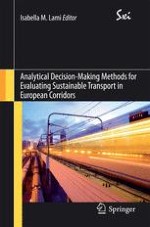2014 | OriginalPaper | Buchkapitel
4. Sectoral Drawbacks in Transport: Towards a New Analytical Framework on European Transport Corridors
verfasst von : Patrick Witte, Tejo Spit
Erschienen in: Analytical Decision-Making Methods for Evaluating Sustainable Transport in European Corridors
Aktivieren Sie unsere intelligente Suche, um passende Fachinhalte oder Patente zu finden.
Wählen Sie Textabschnitte aus um mit Künstlicher Intelligenz passenden Patente zu finden. powered by
Markieren Sie Textabschnitte, um KI-gestützt weitere passende Inhalte zu finden. powered by
